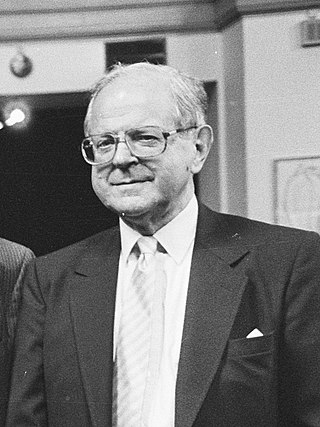
George Robert Acworth Conquest was a British and American historian, poet, and novelist. He was briefly a member of the Communist Party of Great Britain but later wrote several books against Communism.

The Great Purge, or the Great Terror, also known as the Year of '37 and the Yezhovshchina, was a political purge in the Soviet Union that took place from 1936 and 1938. It sought to consolidate Joseph Stalin's power over the Communist Party of the Soviet Union and aimed at removing the remaining influence of Leon Trotsky within the Soviet Union. The term great purge was popularized by the historian Robert Conquest in his 1968 book The Great Terror, whose title was an allusion to the French Revolution's Reign of Terror.
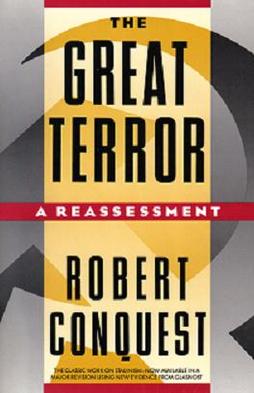
The Great Terror: Stalin's Purge of the Thirties is a book by British historian Robert Conquest which was published in 1968. It gave rise to an alternate title of the period in Soviet history known as the Great Purge. Conquest's title was also an evocative allusion to the period that was called the Reign of Terror during the French Revolution. A revised version of the book, called The Great Terror: A Reassessment, was printed in 1990 after Conquest was able to amend the text, having consulted the opened Soviet archives. The book was funded and widely disseminated by Information Research Department, who also published Orwell's list collected by Conquest's secretary Celia Kirwan.
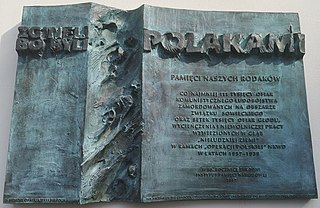
The Polish Operation of the NKVD in 1937–1938 was an anti-Polish mass-ethnic cleansing operation of the NKVD carried out in the Soviet Union against Poles during the period of the Great Purge. It was ordered by the Politburo of the Communist Party against so-called "Polish spies" and customarily interpreted by NKVD officials as relating to 'absolutely all Poles'. It resulted in the sentencing of 139,835 people, and summary executions of 111,091 Poles living in or near the Soviet Union. The operation was implemented according to NKVD Order No. 00485 signed by Nikolai Yezhov.
Throughout the history of the Soviet Union, tens of millions of people suffered political repression, which was an instrument of the state since the October Revolution. It culminated during the Stalin era, then declined, but it continued to exist during the "Khrushchev Thaw", followed by increased persecution of Soviet dissidents during the Brezhnev era, and it did not cease to exist until late in Mikhail Gorbachev's rule when it was ended in keeping with his policies of glasnost and perestroika.
A purge is the forcible removal of undesirable people from political activity, etc.
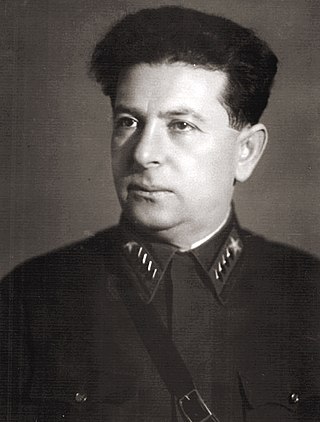
Lev Zakharovich Mekhlis was a Soviet politician and a prominent officer in the Red Army from 1937 to 1940. As a senior political commissar, he became one of the main Stavka representatives on the Eastern Front (1941–1945) during World War II, being involved successively with five to seven Soviet fronts. Despite his fervent political engagement and loyalty to the Communist Party, various Soviet leaders, including Joseph Stalin, criticized and reprimanded Mekhlis for incompetent military leadership during World War II.
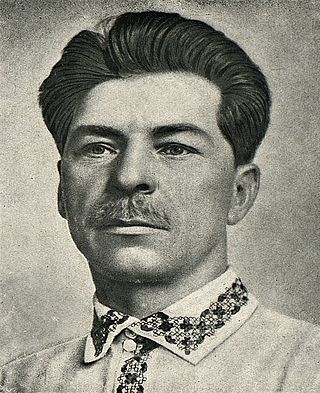
Pavel Petrovich Postyshev was a Soviet politician, state and Communist Party official and party publicist. He was a member of Joseph Stalin's inner circle, before falling victim to the Great Purge.
John Archibald Getty III is an American historian and professor at the University of California, Los Angeles (UCLA), who specializes in the history of Russia and the history of the Soviet Union.

The Bykivnia graves are a National Historic Memorial next to the former village of Bykivnia within Kyiv woodland, Bykivnia Forest. During the Stalinist period in the Soviet Union, it was one of the unmarked mass grave sites where the NKVD, the Soviet secret police, disposed of thousands of executed "enemies of the Soviet state".

Dekulakization was the Soviet campaign of political repressions, including arrests, deportations, or executions of millions of supposed kulaks and their families. Redistribution of farmland started in 1917 and lasted until 1933, but was most active in the 1929–1932 period of the first five-year plan. To facilitate the expropriations of farmland, the Soviet government announced the "liquidation of the kulaks as a class" on 27 December 1929, portraying kulaks as class enemies of the Soviet Union.
The Reign of Terror is a historical period during the early part of the French Revolution.
Soviet Union and state terrorism may refer to:

Between October 1940 and February 1942, in spite of the ongoing German attack on the Soviet Union in June 1941, the Red Army, in particular the Soviet Air Force, as well as Soviet military-related industries were subjected to purges by Joseph Stalin.
The following lists events that happened during 1936 in the Union of Soviet Socialist Republics.
Purges of the Communist Party in the Soviet Union were Soviet political events, especially during the 1920s, in which periodic reviews of members of the Communist Party were conducted by other members and the security organs to get rid of "undesirables". Such reviews would start with a short autobiography from the reviewed person and then an interrogation of him or her by the purge commission, as well as by the attending audience. Although many people were victims of the purge throughout this decade, the general Soviet public was not aware of the purge until 1937.
Revolutionary terror, also referred to as revolutionary terrorism or reign of terror, refers to the institutionalized application of force to counter-revolutionaries, particularly during the French Revolution from the years 1793 to 1795. The term "Communist terrorism" has also been used to describe the revolutionary terror, from the Red Terror in Russia and Cultural Revolution in China to the reign of the Khmer Rouge and others. In contrast, "reactionary terror", often called White Terrors, has been used to subdue revolutions.
Purge, in comics, may refer to:

"Make America Great Again" is an American political slogan and political movement most recently popularized by Donald Trump during his successful presidential campaigns in 2016 and in 2024. "MAGA" is also used to refer to Trump's political base, or to an individual or group of individuals from within that base. The slogan became a pop culture phenomenon, seeing widespread use and spawning numerous variants in the arts, entertainment and politics, being used by both supporters and opponents of Trump's presidency. Originally used by Ronald Reagan as a campaign slogan in his 1980 presidential campaign, it has since been described as a loaded phrase. Multiple scholars, journalists, and commentators have called the slogan racist, regarding it as dog-whistle politics and coded language.

Matvei Fyodorovich Shkiryatov was a Communist Party official and functionary who rose to power in the Soviet Union during the rule of Joseph Stalin. His entire career was spent imposing party discipline through the Central Control Commission of the Communist Party of the Soviet Union. Though far less well known than successive chiefs of the Soviet police, such as Nikolai Yezhov or Lavrentiy Beria, he was arguably as steeply involved as either of them in the repression during the Stalin years. Unlike them, he escaped arrest or public notoriety.









